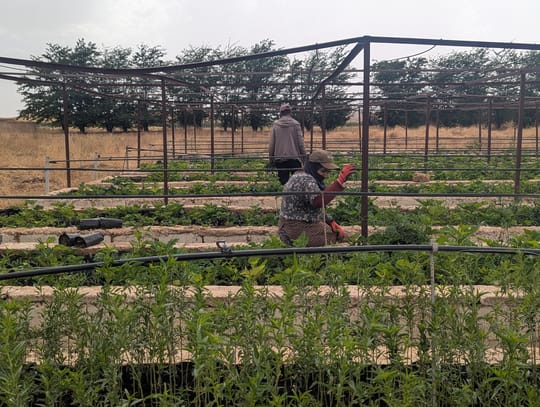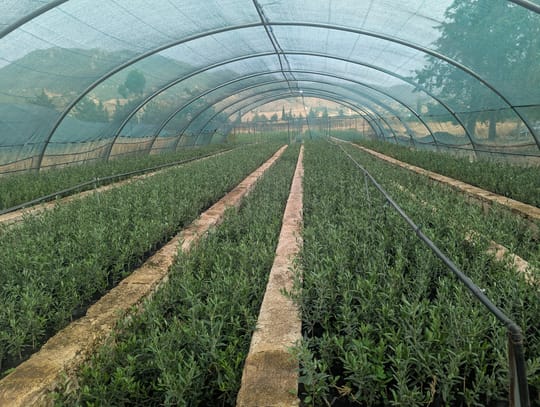A Journey to Khenifra and Ain Leuh: Witnessing Growth and Resilience

Our journey began early. Alongside Si Abdelghani, HAF’s driver, and Yassine, a HAF nursery technician, we headed toward Khenifra province.
Our mission was twofold: to visit the HAF nursery there and to visit the ONSSA (National Office for Food Safety) office to obtain the annual “green card.” This card is essential—it authorizes the nursery to legally distribute saplings to farmers for the season.
After several hours on the road, we finally arrived in the city of Khenifra. There, we met Ahmed, the nursery's caretaker. Together, we went to the ONSSA office. Yassine and Ahmed entered the building to speak with the director, and after a conversation—focused on the hard work and dedication put into the nursery—they emerged with the green card in hand. Ahmed was clearly proud and Yassine seemed equally satisfied. With the card secured, we shared lunch in the city before continuing our journey up into the mountains toward Ain Leuh nursery, which is in partnership with the National Agency of Water and Forests.
This was my first time visiting the Ain Leuh nursery, one of HAF’s largest nurseries. As we arrived, I was deeply moved. The nursery was thriving, full of life—thousands of flourishing saplings of olive, fig, and pomegranate stretched across the land, creating a cool, refreshing breeze in the midst of the summer heat. The site was remarkably well managed, and I found myself wondering about the care and effort behind such an impressive operation.
While walking through the rows of trees, I met Lalla Aisha, one of the nursery’s female workers. She was quietly and diligently weeding around the saplings. Despite the physical labor, she worked with calm determination. When I greeted her and asked how work was going, she explained that normally, Wednesdays are their day off. But today, it was her turn to irrigate the trees. The seven women who work in the nursery take turns coming in on Wednesdays to ensure the saplings are watered twice a day.

Lalla Aisha while taking off the weeds around the saplings - 6 August 2025
Lalla Aisha and the others begin their work at 7 a.m. and finish around 5 p.m. Many of them, including Lalla Aisha, rely on the income from their work in the nursery to support their families. In her case, she is a widow and the sole provider for her children. The nursery job is her only source of income, and it brings stability and dignity to her life.
She shared that she has been working in Ain Leuh nursery since HAF took over the nursery from the Moroccan Agency of Water and Forests. Hearing her story, I felt a deep sense of respect. Her strength, resilience, and commitment reflect the broader impact of HAF’s work—especially in empowering women in agriculture.
I also met Rachid, who joined the nursery six months ago. He helps with management and daily tasks and, like many others, supports his two children through this job.
Later, I spoke with Youssef, the nursery manager. He proudly showed me the olive saplings—so green, healthy, and full of promise. Over 100,000 olive trees are currently growing and will be ready for distribution to farmers in January 2026. He also showed me the large irrigation basin with a capacity of 5,000 tons of water, along with the solar pump that powers the system. The nursery stands as a shining example of sustainable agriculture, community collaboration, and environmental care.

Olive trees inside the greenhouse in Ain Leuh nursery - 6 August 2025
The nursery is not only full of life—it still has room to grow. HAF is planning to plant even more trees to fully utilize the remaining space. The total capacity of the nursery is nearly 800,000 saplings.
As the day ended and we prepared to leave, I saw Lalla Aisha walking out of the nursery. She gave me a warm smile. Her strength, like the trees she helps nurture, left a lasting impression on me.